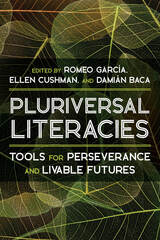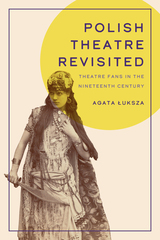206 scholarly books by Arc Humanities Press and 10
start with F
206 scholarly books by Arc Humanities Press and 10
206 scholarly books by Arc Humanities Press
10 start with F start with F
10 start with F start with F

Feminist Medievalisms
Embodiment and Vulnerability in Literature and Film
Usha Vishnuvajjala
Arc Humanities Press, 2024
This book examines feminist textual and cinematic engagements with the idea of the Middle Ages in the nineteenth and twentieth centuries, arguing that the idea of the medieval past is central to the work of novelists and directors interested in embodiment and vulnerability. Careful and illuminating analysis of particular moments in fiction, film, and political discourse dismantles the false binary between popular and intellectual medievalisms, which rests on gendered understandings of genre and audience, while demonstrating that masculinist or patriarchal medievalisms have an equal but understudied counterpart.
The book's first three chapters cover Jane Austen’s Northanger Abbey and its afterlives, the final works of Virginia Woolf, and late twentieth-century film and music videos from the United States. The final chapter examines the treatment of women's bodies and vulnerability in both political theory and recent electoral politics, arguing that they share a common thread of misogyny rooted in the idea of the medieval past, and that one way to challenge that misogyny is by looking at complex feminist engagements with that same past, both real and imagined.
[more]
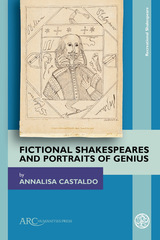
Fictional Shakespeares and Portraits of Genius
Annalisa Castaldo
Arc Humanities Press, 2022
This study is the first to investigate how cultural interpretations of "genius" influence, and are reflected in, fictional portraits of Shakespeare. It explores the wide range of portraits (including children's books, romance novels, graphic novels, and film) that bring Shakespeare to life, and suggests that different portrayals present different conceptions of genius. How does Shakespeare become a genius? How does being a genius affect his life?
In some portraits Shakespeare is a man in love with life, fully immersed in the world around him and therefore able to transform the richness of the world into words. But other portrayals present a man cut off from the world, unable to connect to anyone because his creations are more real to him than people, while others suggest that Shakespeare's genius can only be understood as a supernatural or magical gift. In each portrait, Shakespeare mirrors back to us what we believe about what it means to be a genius.
[more]
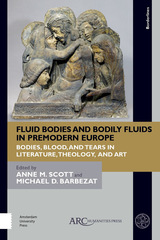
Fluid Bodies and Bodily Fluids in Premodern Europe
Bodies, Blood, and Tears in Literature, Theology, and Art
Anne M. Scott
Arc Humanities Press, 2019
This interdisciplinary collection of essays, containing chapters from specialists in history, art history, medical history, and literature, examines how the intimately familiar language of the body served as a convenient medium through which to imagine and describe transformations of the larger world, both for the better and also for the worse. Its individual contributors demonstrate the myriad ways in which rethinking the human body was one way to approach rethinking the social, political, and religious realities of the world from the Middle Ages until the early modern period.
[more]
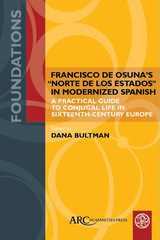
Francisco de Osuna’s "Norte de los estados" in Modernized Spanish
A Practical Guide to Conjugal Life in Sixteenth-Century Europe
Dana Bultman
Arc Humanities Press, 2019
Best known for his works on the mystical practice of meditative recollection, Franciscan friar Francisco de Osuna published his candid manual for lay life, Norte de los estados (North Star) in 1531 before leaving Spain to reside in Antwerp. True to its title, the book was intended as a North Star that would dependably guide readers through the stages of youth, marriage, and widowhood. Although the historical literature on these themes is dominated by the works of his humanist contemporaries, Erasmus of Rotterdam and Juan Luis Vives, Osuna’s close attention to women’s experiences and his critical awareness of social class are distinctive. This first modern edition in Spanish restores Osuna’s reformist voice and expansive vision to the animated conversations on marriage and family in which he engaged. His detailed attention to practical questions and his intense spiritualization of spousal love make it an invaluable resource for understanding conjugal relationships in the popular imagination of the early modern world.
[more]
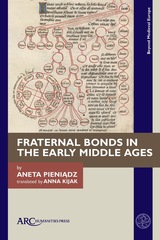
Fraternal Bonds in the Early Middle Ages
Aneta Pieniądz
Arc Humanities Press, 2024
The problem of fraternal relations in the early Middle Ages has not been hitherto studied in detail, especially in comparison with the multitude of studies dealing with the models of marriage, gender-based social roles, or the relations between generations. Historians have been often prone to assume that relations between siblings in European culture were naturally constant, based on loyalty, solidarity, and readiness to act in the common interest, stemming from blood ties. However, this conviction equates the category of brotherhood/fraternitas used by medieval authors with concepts associated with sources from later periods. This study does not concern narrowly defined family history, but is an attempt to examine fraternal relations in the early Middle Ages as a multidimensional cultural phenomenon. As the author seeks to demonstrate, it is difficult to speak of kinship in the ninth century and later without being aware of the religious and ideological implications of the transformations taking place at the time, even if direct traces of the impact of moralizing and theological teachings on the conduct of individuals are hard to capture in the sources.
[more]

French Lessons in Late-Medieval England
The "Liber Donati" and "Commune Parlance"
Rory G. Critten
Arc Humanities Press, 2024
French Lessons in Late-Medieval England presents two fifteenth-century manuals designed to support facility in French among the English, the Liber donati and Commune parlance. These texts treat the grammar, lexis, and orthography of French as well as compiling a selection of entertaining dialogues that model the language in action. Together, they paint a vivid picture of the kinds of French that English learners might desire to wield and of the high levels of fluency that they could achieve. Critten's comprehensive introduction discusses his materials' relevance both for histories of language education and for recent reassessments of the longevity of French in medieval England. His pairing of first-time modern-English translations with facing-page original text makes these fascinating works newly available for a twenty-first-century audience.
[more]
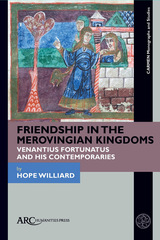
Friendship in the Merovingian Kingdoms
Venantius Fortunatus and His Contemporaries
Hope Williard
Arc Humanities Press, 2022
This book explores how one early medieval poet survived and thrived amidst the political turbulence of sixth century Gaul—with a little help from his friends. Born in northern Italy, Venantius Fortunatus made his career writing for and about members of the Merovingian elite. Although he is no longer dismissed as an opportunistic poetaster who wrote undistinguished flattery for undeserving kings and aristocrats, his work remains unduly neglected. This book reframes Fortunatus as a writer uniquely suited to his times, a professional poet who addressed his contemporaries’ needs and wishes for the prestige and sophistication of Classical culture. His poems and letters enabled his aristocratic patrons to situate themselves in networks, which they made and maintained in order to navigate a post-imperial but not post-Roman world. It makes an important contribution to our understanding of friendship in the Middle Ages and offers a fresh look at the Frankish kingdoms of Merovingian Gaul.
[more]
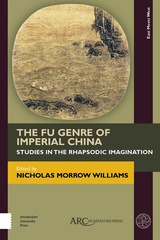
The Fu Genre of Imperial China
Studies in the Rhapsodic Imagination
Nicholas Morrow Williams
Arc Humanities Press, 2019
This is the first book in English to examine the fu, one of China’s oldest and culturally central literary forms, from its origins up to the late imperial era. Fu poems are highly revealing sources for understanding the culture, society, and politics of their periods, and in this volume eleven essays by prominent scholars treat the fu from four major perspectives: its original use in court recitation; as a poetic genre with distinctive formal features; as a vehicle of philosophical inquiry; and as a major mode of political expression.
[more]
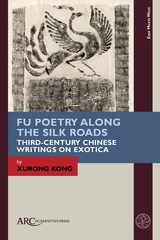
Fu Poetry Along the Silk Roads
Third-Century Chinese Writings on Exotica
Xurong Kong
Arc Humanities Press, 2022
This book explores the dissemination of ideas and information on the early silk roads between Europe and China, through the first detailed study of the Sinicization of foreign objects in Chinese poetic writing of the third century CE.
Third-century literary developments and the prevailing literary works from that era leave us with an impressive amount of information concerning exotic objects, such as plants, animals, and crafts, and record the cultural exchange between distant peoples whose goods, ideas, and technologies entered China.
These hitherto-forgotten rhapsodies express the profound interest and excitement of learned men for foreign objects. They bear witness to the cultural exchanges between China and other civilizations and provide a more nuanced insight of early medieval China as an integrated society rather than an isolated one.
[more]
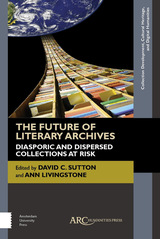
The Future of Literary Archives
Diasporic and Dispersed Collections at Risk
David C. Sutton
Arc Humanities Press, 2018
Literary archives differ from most other types of archival papers in that their locations are more diverse and difficult to predict. The essays collected in this book derive from the recent work of the Diasporic Literary Archives Network, whose focus on diaspora provides a philosophical framework which gives a highly original set of points of reference for the study of literary archives, including concepts such as the natural home, the appropriate location, exile, dissidence, fugitive existence, cultural hegemony, patrimony, heritage, and economic migration.
[more]
READERS
Browse our collection.
PUBLISHERS
See BiblioVault's publisher services.
STUDENT SERVICES
Files for college accessibility offices.
UChicago Accessibility Resources
home | accessibility | search | about | contact us
BiblioVault ® 2001 - 2024
The University of Chicago Press




